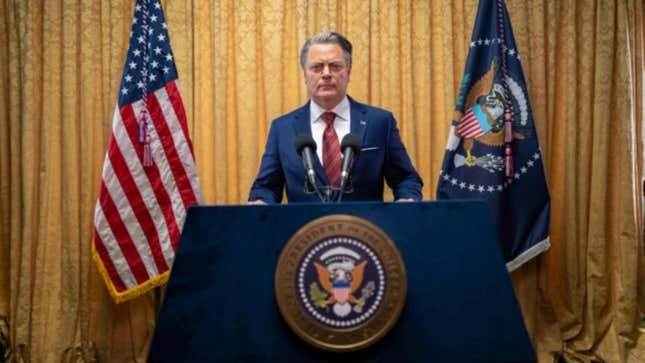It’s been two weeks since I saw Alex Garland’s Civil War, and I still can’t get its chilling final minutes out of my head. Several major things happen in the waning moments of the film, adding an avalanche of emotions on top of everything you’ve already been feeling. The film is powerful and tense enough on its own—but then, at the very end, you feel sadness, shock, relief, pride, excitement, and more all in a quick flurry before the credits roll. I don’t know about you, but I had to sit in stunned silence for a few minutes before leaving.
Recently, io9 spoke with the film’s writer/director Alex Garland and asked him about his inspirations for the ending and how it all came together.

To recap, in the middle of the battle in Washington D.C., Lee (Kirsten Dunst), Joel (Wagner Moura) and Jessie (Cailee Spaeny) find themselves in the White House. The soldiers they’re shadowing move deeper into the building when Secret Service agents start fighting back to defend the President. In an attempt to get the perfect photo, Jessie gets in the line of fire and is about to be shot. Lee jumps in front of the bullet and we see her killed as a series of still photos that Jessie is taking from the ground with Lee standing, then falling, over her.
“It’s a bit of cinema grammar of a baton pass,” Garland said of Lee’s death and how he showed it. “The interesting thing of putting still frames within moving frames that are themselves actually still frames, just flickering past us. And in terms of what is happening over the course of the film, it’s a sort of transferring of a state from one older character into a younger character. It just felt like the appropriate means to describe that moment.”
Interestingly, Garland admitted he messed around with the moment in editing and changed it. “It wasn’t written as a sequence of shots of someone photographing and winding and photographing and winding,” Garland said. “It was written as a single captured image…one perfect bit of photography. But actually, in the edit, the sequence contained slightly more power. So, I went with that instead.”

After Lee dies, Jessie and Joel have no time to mourn and have to continue on to find the President, which they do. He’s about to be executed when Joel asks the soldiers not to yet, so he can get a quote. “Don’t you kill me,” he says. And then they do. Jessie is there to capture the image.
And so the film’s credits roll, with Jessie’s photo of the soldiers over the body of the President slowly developing. “The film is trying to contact reality in ways [other] than cinema a lot of the time,” Garland said of the decision. “So it’s taking its grammar, often, from lived experience or news photography or news footage or documentaries. That is its sort of framework. And actually that trophy shot, with a human being as the trophy, is something that you find again and again. It literally actually occurs exactly in the form you see it. So there’s something that felt appropriate to photography and appropriate to the protagonists and their journey, but also actually real. So a strange, disturbing last sort of hit of reality as the film ends.”
Civil War is now in theaters.
Want more io9 news? Check out when to expect the latest Marvel, Star Wars, and Star Trek releases, what’s next for the DC Universe on film and TV, and everything you need to know about the future of Doctor Who.




















+ There are no comments
Add yours